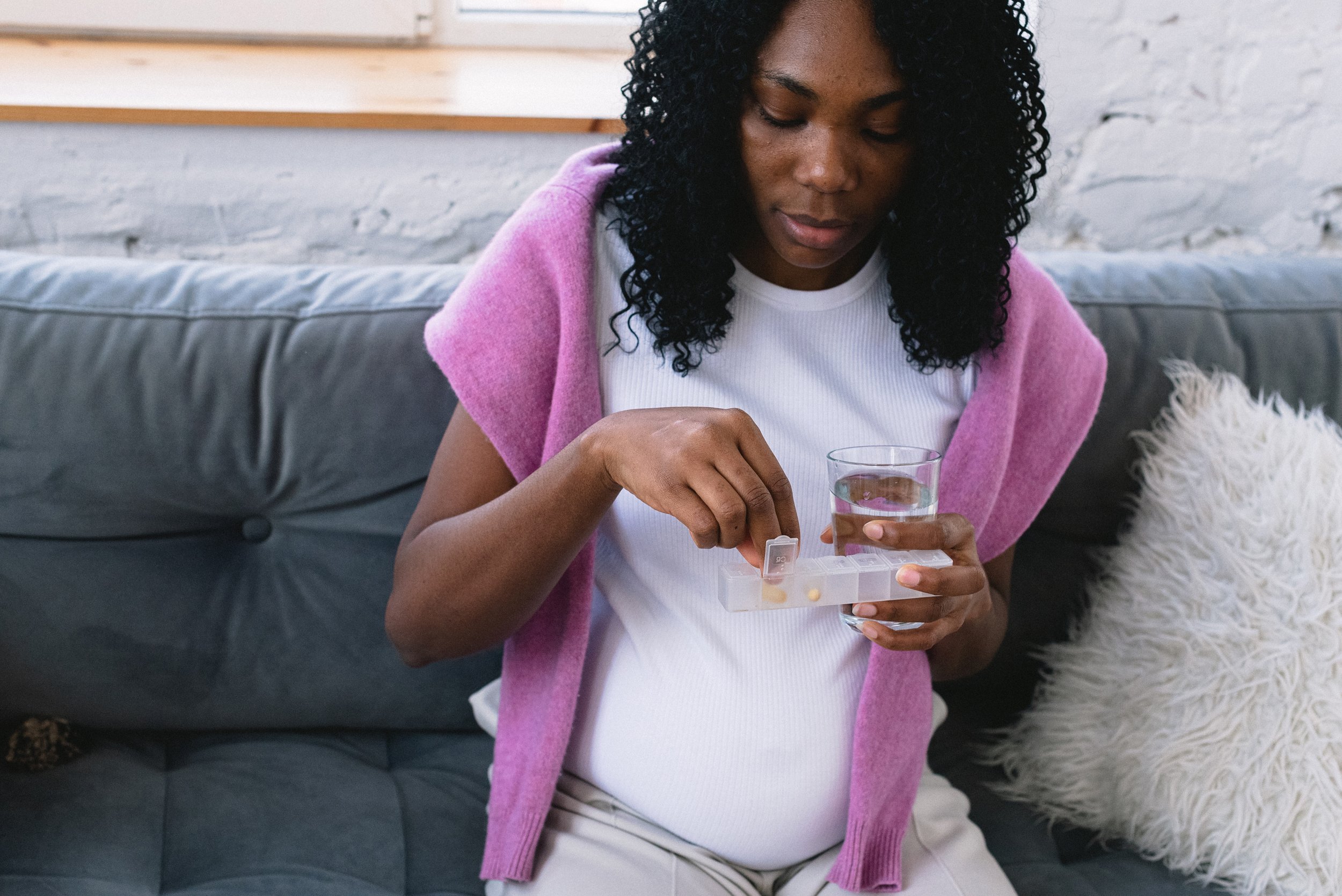5 Ways to Prepare Your PCOS Body for Pregnancy
The idea of starting a family can trigger a rush of emotions - excitement, anxiety, happiness, joy, sadness, grief, fear…really a myriad of feelings. When you factor in trying to get pregnant with PCOS, those emotions can understandably be that much more heightened.
Add it into the mix that if you’ve been formally diagnosed by a doctor with PCOS, you’ve likely heard that getting pregnant with PCOS will likely not be an easy task. But let’s be really honest, there are a number of things that influence how to get pregnant even without PCOS being a factor.
Pregnancy isn’t as easy for most people as the movies make it seem, every month when trying to conceive for a typical couple you’re looking at a 15-25% chance each month for the first year. Throw in PCOS, and your body is up against other symptoms like anovulation (aka not ovulating) inflammation, and hormonal imbalances. It can feel like an uphill battle.
But babe, I’m here to tell you it is possible and it’s completely worth it, 1000%. With a little extra effort and some adjustments in lifestyle and diet, getting pregnant with PCOS can be a real possibility for you.
I’ve personally helped so many women optimize and take control of their fertility - ultimately leading them to get successfully conceive through my program Get Pregnant with PCOS. This is a program designed by a fellow cyster (myself) - backed by education and science. As a Registered Dietitian, I’m qualified and prepared to guide you through this journey.
Starting down your fertility journey can be scary and intimidating but it doesn’t have to be. Let’s start with the basics - preparing your body with 5 easy steps.
1) Take a Quality Prenatal
This easy first step is an essential requirement for any woman looking to get pregnant. When you’re trying to conceive, you want to prepare your body by filling it up with vital vitamins and minerals both you and the baby will need. Some of those nutrients can have a drastic impact on your baby’s health - like folic acid. It comes highly recommended that a woman trying to conceive take 400 micrograms (mcg) of folic acid each day. Why? Well, folic acid helps prevent some major birth defects of the baby’s brain (anencephaly) and spine (spina bifida).
Us cysters are also in need of a vitamin that suits PCOS best - one that works hard by decreasing symptoms while also supporting a growing baby and successful breastfeeding journey (if that’s the route you go). Luckily, as a Registered Dietitian, I’ve identified the essentials needed to support both mama and baby. I’ve designed a PCOS-specific prenatal that contains everything a PCOS mama needs. For some of us too, we really need methylated folate, the most bioavailable form of folate. My prenatal contains this essential version, perfect for every mama’s needs. You can grab this prenatal here.
If you’re not ready for a prenatal but still want to combat PCOS deficiencies - try my PCOS-friendly multivitamin perfect for every cyster.
2) Incorporate Gentle Movement Every Day
We all know how important movement is for physical, mental, and just overall well-being. So, it only makes sense that you can incorporate movement to support a huge undertaking on your body like pregnancy.
In addition to overall wellbeing, movement actually can have an impact on our PCOS hormones and cycle health. When you start working out and providing movement that fits your body’s current needs, something beautiful takes place in your body. Mentally and physically your body starts functioning on that celestial feel-good level. Plus, your body may respond with benefits such as easier periods, fewer or nonexistent cramps, a calmer mental state, and even weight loss. Yes, please! In regards to PCOS, this helps us cysters focus on that main goal, ovulation, which is essential when trying to conceive.
Speaking of conception itself, a study conducted on women trying to get pregnant found that moderate exercise for any length of time was associated with small decreases in time to pregnancy for women of all body types. By incorporating a regular movement practice, you’re giving your body what it needs to set itself up for success in trying to conceive with PCOS and beyond in pregnancy.
3) Get a Good Night’s Sleep
We all need sleep, but potential mothers and those expecting need it even more so. Good sleep hygiene can prepare you for the toils of pregnancy while also improving your current hormonal state. However, for women with PCOS, Clinic-based studies indicate that sleep disturbances such as sleep apnea and excessive daytime sleepiness occur more frequently among women with PCOS compared to women without it. For my fellow PCOS cysters, it’s even more important to be intentional about getting a good night’s sleep.
Some of my chosen tips for good sleep habits:
Don’t exercise within an hour or two before going to bed.
Drink something soothing in the evening, like warm golden milk or a calming tea.
Try out my PCOS-friendly Cortisol Calmer to help manage your cortisol levels, setting your body up for the most optimal sleep schedule.
4) Become Familiar with your Cycle
When you want to get pregnant, you’ll be trying to hit one main cycle event, in particular, ovulation!
However, when you have PCOS, this main event might not rear its head as often as you like - with your body experiencing longer cycles ranging from 30+ days onward, or bleeding randomly. By learning to track your cycle and take advantage of your biomarkers, you’ll be better equipped to identify your main event and use this opportunity to try for a baby. Learn to track your cycle using the Fertility Awareness Method.
Within this method, there are a ton of options available for tracking your cycle based on your comfort level. You can choose a tracking method that only uses cervical fluid and LH (ovulation stick) testing aka Sympto-hormonal or use cervical fluid and basal body temperature like Symptothermal. There are even methods that rely on 1-2 of those biomarkers alone. Check out this resource to get started and find a method that works well for you.
Additionally, hormonal birth control, while often used as a conventional treatment for PCOS, is not a good preparer for pregnancy. When you do get off of birth control for PCOS and try to get pregnant, you’ll realize birth control doesn’t work as a PCOS cure. However, it can have a “bandaid” effect. This means, you may feel relief, but if you switch birth control or get off of it, all your PCOS symptoms (and then some) may return with a vengeance.
If you can, it might just be worth it to explore a fertility awareness option!
5) Start with your Food
It’s time to bring it all together. When it comes to preparing your body for pregnancy, especially when you’re dealing with PCOS, you want to be intentional about what you nourish your body with. Taking it back to basics can be just what you need - ensuring you’re eating a balanced plate for each meal while avoiding restrictive crash diets that just don’t last.
If you’re looking to uplevel your nutrition even more, you can start by adding supplements. But boo, it’s important to make sure you’re choosing supplements designed for PCOS. Some supplements, herbs, and sweeteners can actually do more harm than good.
An easy and surefire way to ensure you’re choosing the best foods, avoiding unnecessary restrictions, and selecting the highest quality, best for your body supplements is to work with a professional. As a Registered Dietitian, backed by science and years of education, I have worked with tons of cysters just like us to get pregnant with PCOS. My program is backed by science and real testimonies of success. In my program, you’ll receive the most comprehensive and up-to-date program to help women with PCOS successfully get pregnant naturally. We’ll work together to optimize your nutrition for fertility, learn how to track your cycle for fertility signs, pick only the best supplements for your body, reduce stress, improve sleep hygiene, and harness the power of exercise.
We work at your pace to help you get the results you want on your timeline. Click below to sign up and Get Pregnant with PCOS, I can’t wait to work with you boo!






